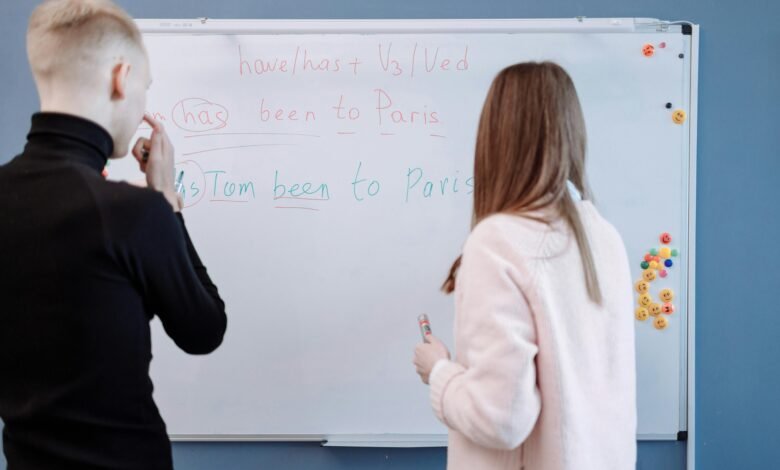
اللغة الإنجليزية تعتبر واحدة من أكثر اللغات انتشاراً في العالم، ويعد فهم قواعدها أمراً أساسياً لتعلمها بفعالية وللتواصل بثقة. في هذا المقال، سنستعرض أهم قواعد اللغة الإنجليزية التي يجب على المبتدئين والمتقدمين على حد سواء أن يتقنوها.
1. الأساسيات: الأفعال والأسماء والضمائر
- الأسماء (Nouns): تدل على الأشخاص والأماكن والأشياء، وتنقسم إلى أسماء مفردة وجمع.
- الأفعال (Verbs): تصف الأفعال والحركات، وتتغير حسب الزمن والشخص.
- الضمائر (Pronouns): تحل محل الأسماء لتجنب التكرار في الجمل.
أمثلة على الأساسيات في اللغة الإنجليزية: الأفعال والأسماء والضمائر.
الأسماء (Nouns):
- أسماء مفردة (Singular Nouns):
- Car: The car is parked outside.
- Book: She read the book last night.
- City: New York is a busy city.
- أسماء جمع (Plural Nouns):
- Cars: There are many cars in the parking lot.
- Books: The library has a lot of interesting books.
- Cities: There are many cities to visit in Europe.
الأفعال (Verbs):
- المضارع البسيط (Simple Present):
- Play: She plays the piano every evening.
- Work: He works in an office downtown.
- Study: They study English at the language school.
- الماضي البسيط (Simple Past):
- Played: They played football yesterday.
- Worked: She worked hard last week.
- Studied: He studied for the exam all night.
- المستقبل البسيط (Simple Future):
- Will play: I will play tennis tomorrow.
- Will work: She will work on her project next month.
- Will study: They will study abroad next year.
الضمائر (Pronouns):
- ضمائر الفاعل (Subject Pronouns):
- I: I like to read.
- You: You are my best friend.
- He: He is coming to the party.
- ضمائر الملكية (Possessive Pronouns):
- Mine: The car is mine.
- Yours: Is this book yours?
- His: The bag is his.
- ضمائر الملكية الملحقة (Possessive Adjectives):
- My: This is my house.
- Your: Is this your pen?
- Her: That is her cat.
هذه الأمثلة تساعد على فهم كيفية استخدام الأسماء، الأفعال، والضمائر بشكل صحيح وفقًا للزمن والسياق في اللغة الإنجليزية.
2. الزمن والصيغ اللغوية
- المضارع البسيط (Simple Present): يستخدم للتعبير عن الأمور الدائمة أو الحقائق العامة.
- الماضي البسيط (Simple Past): يستخدم للتعبير عن أحداث وقعت في الماضي.
- المستقبل البسيط (Simple Future): يستخدم للتعبير عن أحداث ستحدث في المستقبل.
إليك بعض الأمثلة على الزمن والصيغ اللغوية في اللغة الإنجليزية:
المضارع البسيط (Simple Present):
- Affirmative (تأكيدي):
- She reads a book every night.
- They go to the gym twice a week.
- The sun rises in the east.
- Negative (نفي):
- He doesn’t play video games.
- She doesn’t eat meat.
- They don’t live in that house anymore.
- Interrogative (استفهامي):
- Do you like coffee?
- Does he speak Spanish?
- Do they work on weekends?
الماضي البسيط (Simple Past):
- Affirmative:
- She finished her homework yesterday.
- They visited Paris last summer.
- He bought a new car last month.
- Negative:
- She didn’t go to the party last night.
- They didn’t watch the movie.
- He didn’t eat lunch at noon.
- Interrogative:
- Did you enjoy the concert?
- Did she call you yesterday?
- Did they arrive on time?
المستقبل البسيط (Simple Future):
- Affirmative:
- I will study English next year.
- She will visit her grandmother next weekend.
- They will go to the beach in July.
- Negative:
- He won’t be here tomorrow.
- She won’t forget your birthday.
- They won’t travel abroad this summer.
- Interrogative:
- Will you come to the party?
- Will she finish the project on time?
- Will they meet us at the airport?
هذه الأمثلة تساعد في فهم كيفية استخدام الأزمنة المختلفة في اللغة الإنجليزية، سواء كان ذلك للتعبير عن أحداث في الماضي، الحاضر، أو المستقبل.
3. الصيغ والجمل
- الجملة الفعلية (Verb Phrase): تتكون من فعل رئيسي وأحياناً فعل مساعد.
- الجملة الاسمية (Noun Phrase): تتكون من الاسم والصفة التوضيحية.
- الجملة الصفية (Adjective Phrase): توضح الصفة.
إليك بعض الأمثلة على الصيغ والجمل في اللغة الإنجليزية:
الجملة الفعلية (Verb Phrase):
- Simple Verb Phrase:
- She is studying for her exams.
- He has finished his work.
- They will arrive tomorrow.
- Verb Phrase with Modal Verbs:
- She can speak French fluently.
- They should visit their grandparents.
- He might come to the party.
الجملة الاسمية (Noun Phrase):
- Simple Noun Phrase:
- The big house is for sale.
- Her new car is parked outside.
- A cup of coffee would be nice.
- Noun Phrase with Determiners:
- My sister is a doctor.
- Several students attended the lecture.
- This book belongs to me.
الجملة الصفية (Adjective Phrase):
- Simple Adjective Phrase:
- The book is very interesting.
- She is extremely tired.
- He seems quite happy.
- Adjective Phrase with Modifiers:
- The movie was really exciting.
- She looks surprisingly calm.
- He seems rather annoyed.
الجمل المعقدة (Complex Sentences):
- مع جملة تناسبية (Subordinate Clause):
- After he finished his homework, he went to bed.
- Because it was raining, we stayed indoors.
- Although she was tired, she continued working.
- مع جملة عطفية (Coordinate Clause):
- He likes pizza, but he prefers pasta.
- She wants to go shopping, and she also wants to visit the museum.
- I’m tired, so I’m going to bed early.
هذه الأمثلة توضح كيفية بناء الجمل في اللغة الإنجليزية باستخدام الصيغ المختلفة، مما يساعد على فهم كيفية تركيب الجمل بشكل صحيح ومتناسق.
4. الصفات والظروف
- الصفات (Adjectives): توضح صفة الاسم.
- الظروف (Adverbs): توضح زمان الفعل ومكانه وطريقته.
إليك بعض الأمثلة على الصفات والظروف في اللغة الإنجليزية:
الصفات (Adjectives):
- صفات توضيحية (Descriptive Adjectives):
- Beautiful: She lives in a beautiful house.
- Tall: He is a tall basketball player.
- Intelligent: She is an intelligent student.
- صفات ملكية (Possessive Adjectives):
- Her: This is her book.
- Our: Our house is near the park.
- Their: Their dog is very friendly.
- صفات تحديدية (Definite Adjectives):
- The: The best movie I’ve ever seen.
- This: This book is interesting.
- Those: Those shoes are too small.
الظروف (Adverbs):
- ظروف الزمان (Adverbs of Time):
- Now: She is busy now.
- Later: We can discuss it later.
- Soon: They will arrive soon.
- ظروف المكان (Adverbs of Place):
- Here: He lives here.
- There: The keys are there.
- Everywhere: The children were running everywhere.
- ظروف الطريقة (Adverbs of Manner):
- Carefully: She walked carefully on the icy path.
- Quickly: He finished the race quickly.
- Quietly: Please speak quietly in the library.
- ظروف الدرجة (Adverbs of Degree):
- Very: She is very happy today.
- Extremely: The movie was extremely exciting.
- Quite: It’s quite cold outside.
توضيحات إضافية:
- صفات التوضيح (Adjectives) توضح الصفة للإسم.
- الظروف (Adverbs) توضح الفعل وتصف كيفية حدوث الفعل أو ظروفه.
هذه الأمثلة توضح كيفية استخدام الصفات والظروف في اللغة الإنجليزية لتوضيح المعاني وإضافة التفاصيل إلى الجمل.
5. التركيب والبنية
- الجمل المعقدة (Complex Sentences): تتكون من جملتين أو أكثر مرتبطة بصلة تناسبية أو عطفية.
- الجمل البسيطة (Simple Sentences): تتكون من فعل وفاعل.
- الجمل المركبة (Compound Sentences): تتكون من جملتين مستقلتين متصلتين برابطة.
إليك بعض الأمثلة على التركيب والبنية في اللغة الإنجليزية:
الجمل المعقدة (Complex Sentences):
- مع جملة تناسبية (Subordinate Clause):
- After he finished his homework, he went to bed.
- بعد أن أنهى واجبه، ذهب إلى السرير.
- Because it was raining, we stayed indoors.
- لأنه كان يمطر، بقينا في الداخل.
- Although she was tired, she continued working.
- على الرغم من أنها كانت متعبة، استمرت في العمل.
- After he finished his homework, he went to bed.
الجمل البسيطة (Simple Sentences):
- Affirmative Sentence:
- She likes swimming.
- تحب السباحة.
- He plays guitar.
- يعزف الجيتار.
- They work hard.
- يعملون بجد.
- She likes swimming.
- Negative Sentence:
- She does not like coffee.
- لا تحب القهوة.
- He did not go to the party.
- لم يذهب إلى الحفلة.
- They do not eat meat.
- لا يأكلون اللحم.
- She does not like coffee.
- Interrogative Sentence:
- Do you speak French?
- هل تتحدث الفرنسية؟
- Did she finish her homework?
- هل أنهت واجبها؟
- Will they come to the meeting?
- هل سيأتون إلى الاجتماع؟
- Do you speak French?
الجمل المركبة (Compound Sentences):
- مع رابطة (Coordinating Conjunction):
- He likes pizza, but he prefers pasta.
- يحب البيتزا، لكنه يفضل المعكرونة.
- She wanted to go shopping, so she went to the mall.
- أرادت أن تذهب للتسوق، لذا ذهبت إلى المركز التجاري.
- I was tired, yet I couldn’t sleep.
- كنت متعبا، لكن لم أتمكن من النوم.
- He likes pizza, but he prefers pasta.
توضيحات إضافية:
- الجمل المعقدة (Complex Sentences) تتكون من جملتين أو أكثر مترابطة بصلة تناسبية أو عطفية.
- الجمل البسيطة (Simple Sentences) تتكون من فعل وفاعل.
- الجمل المركبة (Compound Sentences) تتكون من جملتين مستقلتين متصلتين برابطة.
هذه الأمثلة توضح كيفية استخدام التركيب والبنية المختلفة في اللغة الإنجليزية لتكوين الجمل بشكل صحيح ومفهوم.
6. الأخطاء الشائعة
- المفردات الخاطئة: استخدام كلمات غير دقيقة.
- التركيب السيء: عدم ترتيب الجمل بشكل صحيح.
- النحو السيء: استخدام الضمائر أو الأفعال بشكل غير صحيح.
فهم قواعد اللغة الإنجليزية أساسي لتحسين مهارات الكتابة والتحدث بثقة. من خلال التمرن المستمر والممارسة النشطة، يمكن للمتعلمين الناجحين أن يحققوا تقدماً في الإتقان اللغوي والتواصل الفعال باللغة الإنجليزية.





